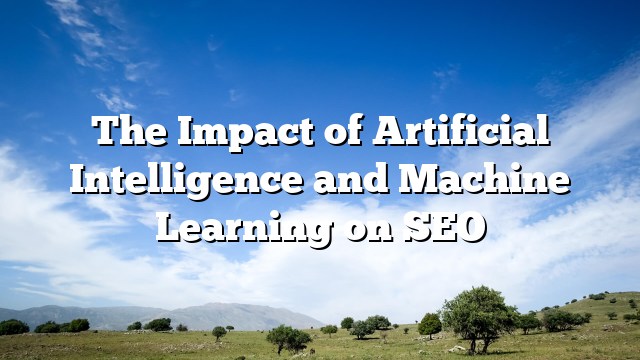Artificial Intelligence (AI) and Machine Learning (ML) have become integral to the evolution of Search Engine Optimization (SEO), transforming how search engines interpret content and how businesses strategize to improve their online visibility. This article delves into the multifaceted impact of AI and ML on SEO, providing updated insights, statistics, and strategies to navigate this dynamic landscape effectively.
The Evolution of SEO: From Keywords to User Intent
Traditionally, SEO focused on keyword optimization, where the frequency and placement of specific terms determined a page’s ranking. However, with advancements in AI and ML, search engines have shifted towards understanding user intent, aiming to deliver more relevant and personalized results.
Google’s introduction of the RankBrain algorithm marked a significant milestone in this transition. RankBrain utilizes machine learning to interpret the context behind search queries, especially those that are ambiguous or have multiple meanings. This shift means that content creators must prioritize creating comprehensive and user-centric content over mere keyword density.
AI-Powered Content Creation and Optimization
The integration of AI in content creation has streamlined the process of developing SEO-friendly material. Tools like Wix’s AI feature can generate entire blog posts, optimizing them for search engines by suggesting relevant keywords and structuring content effectively. This not only enhances efficiency but also ensures that the content aligns with current SEO best practices.
Personalization of Search Results
AI enables search engines to tailor results based on individual user behavior, preferences, and search history. This personalization means that two users entering the same query might receive different results, each aligned with their unique profiles. For businesses, this underscores the importance of understanding their target audience deeply and creating content that resonates with specific user segments.
Voice Search and Natural Language Processing (NLP)
The rise of voice-activated assistants like Siri, Alexa, and Google Assistant has popularized voice search, which often involves conversational queries. AI-driven Natural Language Processing allows search engines to comprehend and process these natural language queries effectively. To optimize for voice search, content should be structured to answer specific questions clearly and concisely, often in a conversational tone.
Enhanced Data Analysis and Predictive Insights
AI facilitates the rapid analysis of vast datasets, providing insights into user behavior, content performance, and emerging trends. This capability allows SEO professionals to make data-driven decisions, predict shifts in user preferences, and adjust strategies proactively. According to Forbes, AI has made mass data analysis a much faster process, helping organizations generate reports in a fraction of the time of manual audits.
Combating AI-Generated Content and Maintaining Authenticity
The proliferation of AI-generated content has led to an increase in search engine spam, prompting search engines to develop AI-based systems to identify and prioritize authentic human voices. As AI continues to evolve, maintaining content authenticity becomes crucial. Businesses should focus on creating genuine, valuable content that reflects human insights and expertise to stand out in an increasingly automated digital landscape.
Key Statistics Highlighting AI’s Impact on SEO
-
Adoption of AI in Marketing: A significant percentage of marketers have integrated AI tools into their SEO strategies, leveraging them for content creation, keyword analysis, and performance optimization.
-
Improved Efficiency: Businesses utilizing AI for SEO have reported substantial improvements in efficiency, with AI handling tasks such as data analysis and report generation more swiftly than manual methods.
-
Revenue Growth: A notable proportion of marketers have observed revenue increases after implementing AI in their SEO practices, attributing growth to enhanced content strategies and better user engagement.
Strategies for SEO Success in the AI Era
-
Focus on User Intent: Develop content that addresses the underlying needs and questions of your target audience, moving beyond keyword-centric approaches.
-
Leverage AI Tools: Utilize AI-powered SEO tools for keyword research, content optimization, and performance tracking to stay ahead of competitors.
-
Optimize for Voice Search: Incorporate natural language and conversational phrases into your content to align with the growing prevalence of voice-activated searches.
-
Maintain Content Authenticity: Ensure that your content reflects genuine human insights and expertise, distinguishing it from generic AI-generated material.
-
Stay Informed on AI Developments: Keep abreast of advancements in AI and ML to understand their implications for SEO and adjust your strategies accordingly.
Conclusion
The integration of Artificial Intelligence and Machine Learning into SEO practices has ushered in a new era of search engine dynamics. By understanding and adapting to these changes, businesses can enhance their online visibility, provide more value to users, and achieve sustained success in the digital marketplace.
